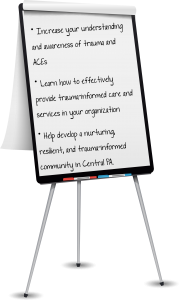This free half-day training seminar held on Tuesday, September 25th helped participants develop skills to effectively support individuals with a history of trauma and build understanding and application of trauma-informed strategies community-wide.
Event Information
 Trauma is a widespread, harmful, and costly public health problem. It occurs as a result of violence, abuse, neglect, loss, disaster, war and other emotionally harmful experiences. Traumatic exposure cuts across age groups, gender, socioeconomic status, race, ethnicity, geography and sexual orientation. Trauma increases an individual’s long-term risk of serious physical and behavioral health problems, often leading to costly health care utilization. Trauma-informed care (TIC) is an approach to engaging people with histories of trauma that recognizes the presence of trauma symptoms and acknowledges the role that trauma has played in their lives. Adopting trauma-informed approaches to care can potentially improve client/patient engagement, enhance outcomes, and reduce avoidable care and excess costs for both the health care sector and social service systems.
Trauma is a widespread, harmful, and costly public health problem. It occurs as a result of violence, abuse, neglect, loss, disaster, war and other emotionally harmful experiences. Traumatic exposure cuts across age groups, gender, socioeconomic status, race, ethnicity, geography and sexual orientation. Trauma increases an individual’s long-term risk of serious physical and behavioral health problems, often leading to costly health care utilization. Trauma-informed care (TIC) is an approach to engaging people with histories of trauma that recognizes the presence of trauma symptoms and acknowledges the role that trauma has played in their lives. Adopting trauma-informed approaches to care can potentially improve client/patient engagement, enhance outcomes, and reduce avoidable care and excess costs for both the health care sector and social service systems.
About the Speaker
Educator. Advocate. Mindfulness Instructor.
 Monica Sullivan, M. Ed. has devoted her career to working with children and families as well as the organizations that support them. At HFP she incorporates creativity into her training sessions, along with a strong focus on wellness-based activities (like yoga) and mindfulness. Since 2007, Monica has provided training and program management services for HFP. She touches on everything from site logistics and evaluation to leading training sessions that promote trauma-informed change within the work environment. Monica is dedicated to integrating brain science into her innovative on-site training sessions. Monica is also a mindfulness-based stress reduction (MBSR) facilitator and a certified yoga teacher. She seeks ways to integrate these reflective practices in her work with organizations to promote trauma responsive environments that build staff and client resilience. When she’s not assisting Philadelphia organizations to become more trauma-informed, Monica enjoys cooking and baking, being outside and making art.
Monica Sullivan, M. Ed. has devoted her career to working with children and families as well as the organizations that support them. At HFP she incorporates creativity into her training sessions, along with a strong focus on wellness-based activities (like yoga) and mindfulness. Since 2007, Monica has provided training and program management services for HFP. She touches on everything from site logistics and evaluation to leading training sessions that promote trauma-informed change within the work environment. Monica is dedicated to integrating brain science into her innovative on-site training sessions. Monica is also a mindfulness-based stress reduction (MBSR) facilitator and a certified yoga teacher. She seeks ways to integrate these reflective practices in her work with organizations to promote trauma responsive environments that build staff and client resilience. When she’s not assisting Philadelphia organizations to become more trauma-informed, Monica enjoys cooking and baking, being outside and making art.
TFEC’s Early Education Initiative is Committed to Creating Community Resilience through Trauma-Informed Practices
For over three years, TFEC’s Parents & Partners program (funded by the Community Innovation Zone Grant) worked to support the growth and development of families and children. Through this work, it became clear that many families within our communities face complex and multi-faceted barriers, including homelessness and transience, unemployment, substance abuse, and domestic violence. These individual, family, and community-level problems have immediate and long-term negative effects on children’s ability to be healthy, happy, and safe as they learn and navigate their environment. Local teachers report that they see more children with increasingly negative behaviors who are less able to self-regulate and problem solve. Such behaviors trigger larger consequences that may include suspension, dropping out of school, and criminal behavior. In addition, systems designed to meet the needs of these children and families are often fragmented and difficult to effectively navigate. In response, we seek to work toward the sustained creation of a trauma-informed community, and know that such an approach must be a community-wide effort.
Event Resources
Community Resilience and Trauma Informed Practice
Trauma-Informed Organizational Assessments-GRTICN
Understanding Childhood Trauma-NCTSI
Standards of Practice for Trauma-Informed Care – OR




